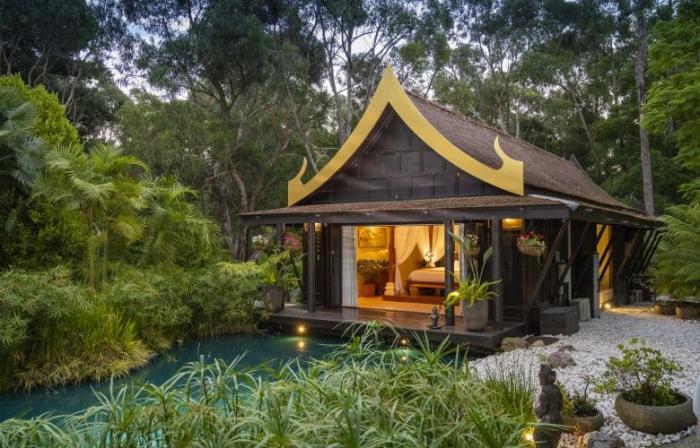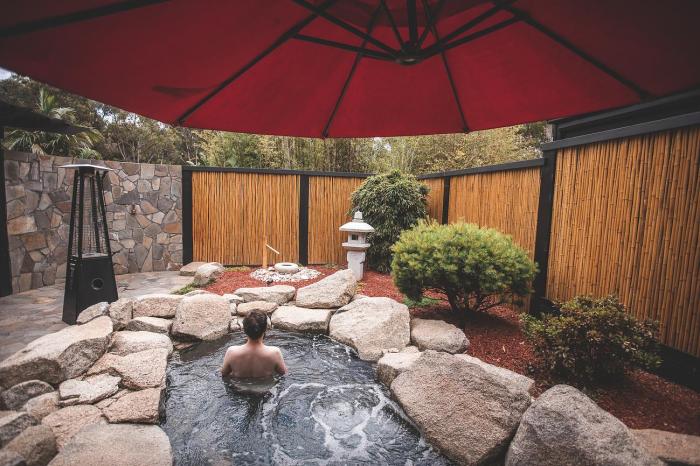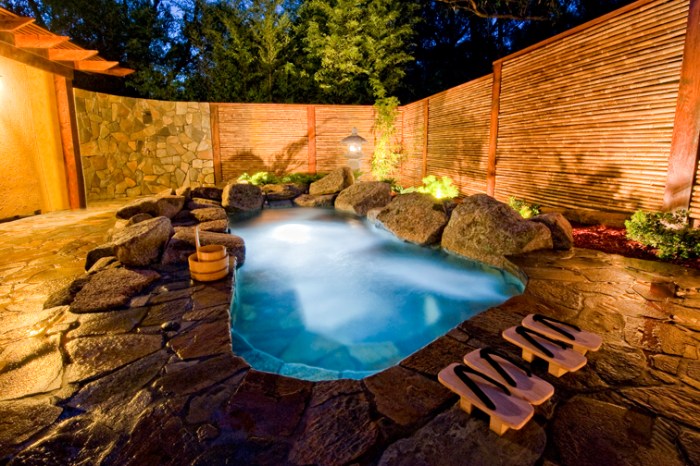Japanese mountain retreats, known as “ryokan” or “minshuku,” offer a unique blend of natural beauty, cultural immersion, and wellness experiences. Nestled amidst breathtaking landscapes, these retreats provide a sanctuary for relaxation, rejuvenation, and spiritual exploration.
From the towering peaks of Mount Fuji to the serene slopes of the Japanese Alps, Japan’s mountainous terrain offers a diverse range of landscapes that shape the character of each retreat. Whether you seek tranquility, adventure, or a deeper connection to nature, a Japanese mountain retreat promises an unforgettable experience.
Mountainous Geography
Japan is renowned for its breathtaking mountainous landscapes, a testament to its complex geological history and volcanic activity. The archipelago boasts a diverse range of mountains, from towering peaks to gentle slopes, each contributing to the country’s unique natural beauty.
Types of Mountains
Japanese mountains can be broadly categorized into two main types:
- Volcanic Mountains:Formed by the accumulation of volcanic material, these mountains are characterized by their conical shapes and often have active or dormant volcanoes at their summits. Mount Fuji, Japan’s iconic symbol, is a prime example of a volcanic mountain.
- Non-Volcanic Mountains:These mountains are composed of sedimentary or metamorphic rocks and were formed through geological processes such as folding, faulting, and erosion. They tend to have more rounded and eroded profiles.
Geological Formations
The Japanese archipelago is situated at the convergence of four tectonic plates, which has resulted in significant geological activity throughout its history. This activity has shaped the mountainous landscape, creating a variety of geological formations:
- Thrust Faults:These faults occur when one tectonic plate slides beneath another, resulting in the formation of mountain ranges. The Hidaka Mountains in Hokkaido are an example of mountains formed by thrust faulting.
- Fold Mountains:These mountains are formed when layers of rock are folded and uplifted by tectonic forces. The Hida Mountains in central Japan are a notable example.
- Volcanic Calderas:These are large, crater-like depressions formed when a volcano collapses after a major eruption. Mount Aso in Kyushu is one of the largest calderas in the world.
Volcanic Activity
Japan is home to over 100 active volcanoes, making it one of the most volcanically active countries in the world. Volcanic eruptions have played a significant role in shaping the mountainous landscape, creating new mountains, altering existing ones, and contributing to the country’s rich geothermal resources.
Cultural Significance
Mountains hold immense cultural significance in Japan, deeply intertwined with the nation’s history and spiritual beliefs. They serve as sacred abodes for deities and are revered as symbols of strength, resilience, and the ephemeral nature of life.
In Shintoism, mountains are believed to be the dwelling places of kami (spirits or deities). They are considered sacred and are often designated as holy sites, attracting pilgrims and worshippers seeking spiritual enlightenment and purification.
For those seeking an unforgettable underwater experience, a Nusa Dua snorkeling tour is a must. Explore the vibrant coral reefs and swim alongside colorful marine life. And if you’re traveling solo, don’t miss out on the opportunity to join a group of like-minded individuals on holidays for single people . These organized trips offer a chance to connect with other solo travelers and make lasting memories.
Role in Buddhism
Buddhism, introduced to Japan in the 6th century, further emphasized the spiritual significance of mountains. Many Buddhist temples and monasteries were built on or near mountains, serving as places of meditation, retreat, and spiritual cultivation.
Mount Hiei, located northeast of Kyoto, is a prominent example of a sacred mountain in Buddhism. It is home to the Enryaku-ji temple complex, one of the most important Tendai Buddhist centers in Japan.
Mountain Pilgrimages and Festivals
Mountain pilgrimages (yamabushi) have been an integral part of Japanese culture for centuries. Pilgrims undertake arduous journeys to sacred mountains, seeking spiritual purification, physical endurance, and a deeper connection with nature.
Various festivals and rituals are held throughout the year to celebrate the cultural and spiritual significance of mountains. One notable festival is the Yamahoko Junko in Kyoto, where elaborate floats adorned with intricate tapestries and sculptures are paraded through the streets.
Retreats and Accommodations
Nestled amidst serene landscapes, traditional Japanese mountain retreats offer an escape from urban hustle and bustle. These retreats, known as “ryokan” or “minshuku,” provide a unique blend of tranquility, cultural immersion, and natural beauty.
Ryokans, typically more upscale, offer a range of amenities and services to cater to guests’ needs. They feature spacious guest rooms with traditional tatami flooring and futon bedding, as well as private onsen (hot spring baths) for relaxation and rejuvenation.
Guests can indulge in authentic Japanese cuisine prepared with fresh local ingredients, and enjoy the attentive hospitality of the innkeepers.
Minshuku, on the other hand, are smaller and more budget-friendly options. They offer a more homey atmosphere and a chance to experience the local way of life. Guests can stay in shared or private rooms and enjoy home-cooked meals prepared by the innkeepers.
Both ryokans and minshuku often provide guided hikes, cultural activities, and access to nearby hiking trails.
Types of Mountain Retreats
Mountain retreats in Japan vary in location, price range, and amenities offered. Here’s a table comparing different types of retreats:
| Type | Location | Price Range | Amenities |
|---|---|---|---|
| Luxury Ryokan | Scenic mountaintop locations | High | Private onsen, gourmet dining, guided tours |
| Traditional Ryokan | Mountain villages and hot spring towns | Mid-range | Communal onsen, traditional cuisine, cultural activities |
| Minshuku | Remote mountain villages | Budget-friendly | Shared or private rooms, home-cooked meals, local experiences |
Activities and Experiences: Japanese Mountain Retreat

Japanese mountain retreats offer a diverse range of activities and experiences that promote relaxation, rejuvenation, and spiritual growth.
Forest bathing, a practice that involves immersing oneself in the sights, sounds, and scents of the forest, is a popular activity at these retreats. Studies have shown that forest bathing can reduce stress levels, improve mood, and boost the immune system.
Hiking
The mountainous terrain surrounding many retreats provides ample opportunities for hiking. Hiking trails vary in difficulty, catering to both beginners and experienced hikers. Along the trails, hikers can enjoy stunning views of the surrounding mountains, forests, and waterfalls.
Meditation and Spiritual Reflection
Mountain retreats often provide dedicated spaces for meditation and spiritual reflection. These spaces may include meditation halls, yoga studios, or simply quiet corners in the natural surroundings. Retreat participants can use these spaces to connect with their inner selves, practice mindfulness, and seek spiritual guidance.
Cuisine and Gastronomy

The mountain retreats in Japan offer a culinary experience that is both authentic and refined. The cuisine emphasizes fresh, seasonal ingredients and traditional cooking techniques that have been passed down through generations.
Many of the dishes served at mountain retreats are made with locally sourced ingredients, such as wild mushrooms, mountain vegetables, and game. The chefs at these retreats often use traditional cooking methods, such as grilling, steaming, and simmering, to bring out the natural flavors of the ingredients.
When it comes to island holiday destinations , there’s something for everyone. Whether you’re looking for a secluded paradise to escape the hustle and bustle of everyday life or an action-packed adventure filled with snorkeling and swimming, there’s an island out there waiting to welcome you.
One such destination is Can Garden Beach , known for its crystal-clear waters and lush greenery. If you’re short on time but still craving some beach time, consider a short break beach holiday . These getaways are perfect for those who want to soak up the sun and sand without having to take a lot of time off work.
Tea Ceremonies
Tea ceremonies are an important part of Japanese culture, and they are often held at mountain retreats. These ceremonies are a way to relax and connect with nature, and they can also be a way to learn about Japanese culture and history.
During a tea ceremony, guests are served matcha, a powdered green tea, which is whisked with hot water until it becomes frothy. The tea is then served in small cups, and guests are encouraged to enjoy the tea’s delicate flavor and aroma.
Other Dining Rituals
In addition to tea ceremonies, there are a number of other dining rituals that are practiced at mountain retreats. These rituals include:
- Kaiseki ryori:A multi-course meal that is served in a traditional Japanese style.
- Shojin ryori:A vegetarian meal that is often served at Buddhist temples.
- Nabemono:A hot pot dish that is cooked at the table.
Design and Aesthetics
Japanese mountain retreats are renowned for their serene and minimalist aesthetic, which is deeply rooted in traditional Japanese architecture and design principles. These principles emphasize harmony with nature, the use of natural materials, and a seamless integration of indoor and outdoor spaces.
Traditional Designs
Traditional Japanese mountain retreats often feature a simple and understated design, with an emphasis on natural materials such as wood, stone, and bamboo. The buildings are typically low-slung and nestled into the surrounding landscape, with large windows and sliding doors that blur the boundaries between the interior and exterior.
Contemporary Designs, Japanese mountain retreat
Contemporary mountain retreats in Japan have evolved while retaining the core principles of traditional design. They often incorporate modern materials and techniques, such as glass and steel, to create a more open and airy feel. However, the focus on natural materials and the integration of indoor and outdoor spaces remains central to the design.
Natural Materials and Indoor-Outdoor Integration
The use of natural materials in Japanese mountain retreats is not only aesthetically pleasing but also practical. Wood, stone, and bamboo are all durable and weather-resistant, making them well-suited to the often harsh mountain environment. Additionally, these materials help to create a warm and inviting atmosphere, fostering a sense of connection with nature.
The integration of indoor and outdoor spaces is another key feature of Japanese mountain retreats. Large windows and sliding doors allow natural light to flood into the interior, while outdoor terraces and balconies provide opportunities for guests to enjoy the surrounding scenery.
This seamless transition between the interior and exterior creates a sense of spaciousness and tranquility.
Escape to idyllic island holiday destinations where azure waters meet pristine sands. Discover the hidden gem of Can Garden Beach , where tranquility and adventure intertwine. Whether you seek a short break beach holiday or an unforgettable snorkeling experience, embark on a Nusa Dua snorkeling tour . For those seeking solo adventures, explore tailored holidays for single people , designed to connect you with like-minded travelers.
Sustainability and Environmental Practices

Japanese mountain retreats prioritize preserving the pristine environment while offering rejuvenating experiences. They implement sustainable practices to minimize their ecological footprint and protect the natural surroundings for future generations.
Retreats utilize renewable energy sources such as solar and geothermal energy to power their facilities. They also implement energy-efficient lighting and appliances to reduce energy consumption. Water conservation measures, such as low-flow fixtures and rainwater harvesting systems, are widely adopted.
Waste Management
Waste management is a crucial aspect of sustainability at mountain retreats. They implement comprehensive waste reduction, recycling, and composting programs. Organic waste is composted and used as natural fertilizer in gardens or surrounding forests. Non-recyclable waste is disposed of responsibly through partnerships with local waste management companies.
Conservation and Restoration
Retreats actively engage in conservation and restoration efforts. They collaborate with local organizations and experts to protect endangered species and habitats. Some retreats have established nature trails and educational programs to raise awareness about the importance of preserving the local ecosystem.
Health and Well-being
Immersing oneself in the serene embrace of Japanese mountain retreats offers a myriad of health and wellness benefits. The crisp mountain air, tranquil surroundings, and opportunities for relaxation and rejuvenation work synergistically to promote both physical and mental well-being.
The fresh air, unpolluted by urban congestion, invigorates the lungs and enhances respiratory health. The gentle breezes carry the invigorating scent of pine needles and wildflowers, creating a natural aromatherapy that soothes the mind and uplifts the spirits.
Stress Reduction
The serene atmosphere of mountain retreats provides an ideal setting for stress reduction. The absence of urban noise and distractions allows for deep relaxation and introspection. Studies have shown that spending time in nature can significantly reduce levels of stress hormones, such as cortisol, while promoting the release of endorphins, which have mood-boosting effects.
Mental Well-being
The tranquility of mountain retreats fosters a sense of mental well-being. The absence of electronic distractions and the opportunity to connect with nature promote mindfulness and present-moment awareness. This environment encourages self-reflection, emotional healing, and a renewed sense of purpose.
Physical Health
In addition to the mental benefits, mountain retreats also offer opportunities for physical health improvements. The mountainous terrain encourages physical activity, such as hiking, trekking, or simply exploring the surroundings. These activities not only strengthen the body but also improve cardiovascular health and boost metabolism.
Ultimate Conclusion
Japanese mountain retreats are not just destinations but transformative experiences that leave a lasting impact on the body, mind, and soul. Whether you embark on a rejuvenating forest bath, meditate amidst tranquil surroundings, or savor the flavors of local cuisine, these retreats offer a profound connection to the natural world and a renewed sense of well-being.


